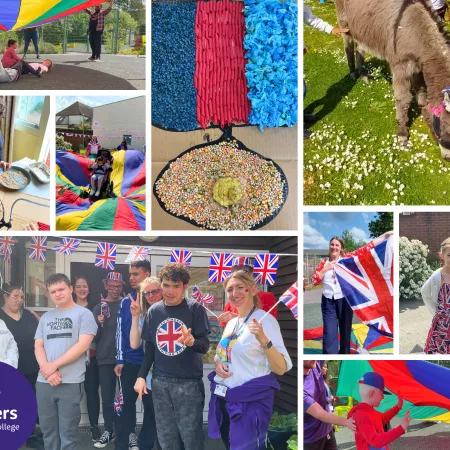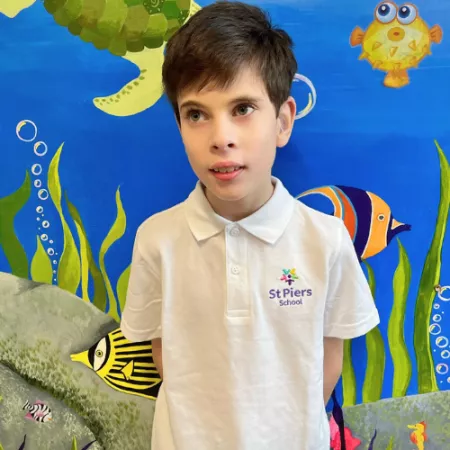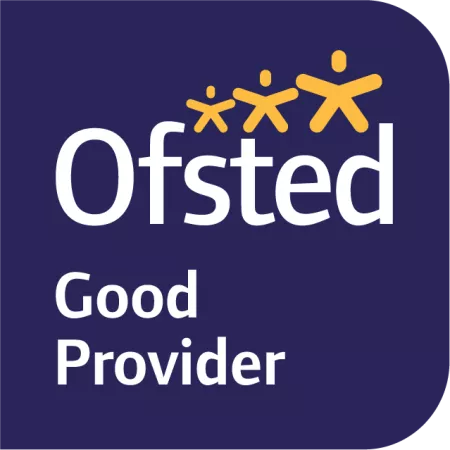Our Curriculum
This page outlines St Piers School’s approach to delivering a rich and inclusive curriculum for all children and young people we support.
Our Aim
Our aim is to enable every pupil to reach their full potential in a way that reflects their individual abilities and needs.
Our six areas of the curriculum
We provide a broad and balanced curriculum made up of six key areas, delivered through three learner journeys; Learning for Life, Skills for Life and Specialist Skills, designed to meet pupils’ individual needs, instil values, encourage resilience and independence, and provide essential learning and skills for life.
Communication, Interaction & Language at St Piers School
At St Piers School, every student is supported to develop their understanding and use of English through a highly personalised approach. Communication underpins independence, life skills, and access to all areas of the curriculum.
We use a total communication approach, combining spoken and written language with a range of augmentative and alternative communication (AAC) methods. These may include:
- Signing and gesture
- Symbols, objects, and touch cues
- Songs and sensory cues
- Eye gaze, switches, and electronic AAC
Our My Communication, Interaction & Language curriculum includes the teaching of speaking, listening, reading, and writing. We follow the Twinkl Phonics programme, adapting it to meet the needs of every learner and ensure accessibility.
Teaching takes place both discreetly and through cross-curricular activities, embedded across the school day. Lessons are designed with flexibility to reflect individual learning journeys, with students taught in small groups and 1:1 where needed.
Communication is central to everything we do and is delivered through a multidisciplinary approach, ensuring students can understand the world around them and their role within it.
At St Piers, we support students to understand and use mathematics in everyday life. Our approach is practical, personalised, and inclusive, empowering every student—whatever their cognitive level—to engage with numeracy in meaningful ways.
Our Approach
Maths is key to developing independence and functional life skills. We deliver a three-tiered curriculum that adapts as students progress through Lower, Middle, and Upper School. This model ranges from therapeutic, sensory-based learning to more formalised teaching aligned with the National Curriculum.
Staff use a variety of strategies, motivators, and teaching tools to ensure maths is accessible, ambitious, and relevant for each student’s learner journey.
Tier 1: Learning for Life – Therapeutic Numeracy
For students needing a more sensory and developmental approach, maths is introduced through:
- Multi-sensory experiences (e.g. objects, routines, spatial awareness)
- Exploration of basic concepts: number, shape, measurement, calculation
- Activities linked to sequencing, organisation, and problem solving
Learning is supported by our therapy teams (OT, SaLT, Physio) and delivered in both class and therapy settings. Facilities like the sensory suite, swimming pool, and extensive outdoor areas help embed mathematical understanding through movement, communication, and real-world experience.
Tier 2 & 3: Skills for Life & Specialist Skills
As students develop, maths becomes more structured. We build on earlier concepts through:
- Practical tasks, stories, songs, games, and real-life scenarios
- ICT tools such as interactive whiteboards, iPads, and platforms like Twinkl Go, BKSB, and Active Learn
- Differentiated and personalised lessons based on each student’s needs and cognitive level
In Upper School, we place greater focus on applied maths through our Life Skills Programme. Functional maths is embedded across home management, enterprise projects, and community-based learning to prepare students for adulthood.
At St Piers, we take a holistic approach to personal development, embedding it across the school day through class-based lessons, therapeutic support (ELSA), and specialist sessions like yoga and horse riding.
Building Independence
Students develop practical life skills tailored to their needs, including:
- Personal care and hygiene
- Food preparation and household tasks
- Understanding puberty and growing up
- Emotional regulation and decision-making
Relationships & Sex Education (RSE)
RSE is adapted to each learner and covers:
- Emotions and healthy relationships
- Consent, safety, and rights
- The body, reproduction, and sexual health
- Recognising and reporting harm
Staying Safe & Connected
We teach students how to stay safe and engaged in their communities. Topics include:
- Online safety and digital awareness
- Road safety and accident prevention
- Cultural understanding and celebrating diversity
- Resilience, problem-solving, and asking for help
Yoga & Riding for the Disabled
Students benefit from regular yoga and horse riding sessions to support:
- Physical and sensory development
- Emotional wellbeing and self-regulation
- Confidence, coordination, and focus
Creative Arts is a powerful tool for learning, self-expression, and connection. At St Piers, we value it both as a discrete subject and as an integral part of our wider curriculum.
Why It Matters
Creative Arts fosters vital skills in:
- Communication and self-expression
- Collaboration and negotiation
- Emotional wellbeing and confidence
These skills support students’ growth and open access to other areas of learning.
Our Approach
- One topic each year has a Creative Arts focus taught through dedicated lessons.
- Drama and music are woven into subjects like Literacy, Numeracy, Communication, and Science.
- In KS4 and Post-16, Drama and Music are used primarily for pleasure and enrichment, with elements covered through EQUALS modules and subjects like RE and Sensory Stories.
Enrichment & Delivery
- Specialist staff deliver Creative Arts through whole-class, small group, and 1:1 sessions.
- Sessions take place in classrooms, the Creative Arts room, and a themed interactive studio set that changes each term.
- Students enjoy performances from visiting artists, local schools, and live shows like pantomimes. The annual Christmas show is a much-loved highlight.
At St Piers, we believe that physical activity in a safe, supportive environment plays a vital role in promoting physical, emotional, and social wellbeing.
Physical Education
Our inclusive PE curriculum is broad, balanced, and personalised to meet the needs of every student. It develops physical skills, fitness, and confidence, while fostering:
- Concentration, self-discipline, and teamwork
- Respect for others and an appreciation of diversity
- Risk awareness and independent participation
Students take part in a wide range of activities, including:
- Gymnastics, swimming, athletics, games, and trampoline
- Outdoor adventures: cycling, hiking, paddle sports, orienteering, and more
- Functional fitness and movement (e.g. MATP and health-related exercise)
Onsite and offsite facilities support real-world learning, preparing students for active lives beyond school.
School Sport
We offer enriching and competitive opportunities through:
- Intra- and inter-school events via the Surrey School Games
- Activity weeks and links with local and national disability sport organisations
Representing the school helps students build pride, identity, and belonging, while promoting spiritual, moral, social, and cultural development.
Physical Activity Across the Day
We embed physical activity across the school day to:
- Boost physical and emotional health
- Improve behaviour, focus, and academic achievement
- Promote resilience, confidence, and independence
By encouraging active lifestyles, we help students understand how to stay healthy in both body and mind—now and into adulthood.
Computing
At St Piers, students explore and use digital devices in ways that enhance their learning and everyday life. We promote safe, purposeful use of technology through:
- Exploring common devices (e.g. tablets, laptops, appliances)
- Learning about control, use, and basic programming
- Accessing content for communication, learning, and enjoyment
- Developing digital literacy and understanding online safety (e.g. personal data, social media, gaming, fake news)
Every class has access to devices like iPads, laptops, interactive whiteboards, and switch-activated tools. Learning is supported by platforms such as Twinkl Go, BKSB, and Active Learn.
Outdoor & Woodland Learning / Forest School
Our Outdoor and Woodland Learning, including Forest School, supports learning through real-world, hands-on experiences in our ancient woodland and pond. These sessions develop:
- Confidence, independence, and problem-solving
- Sensory exploration and emotional regulation
- Cross-curricular learning in Science, Geography, and more
Students learn through nature-based activities like habitat exploration, mini-beast hunts, weather observation, and environmental science.
Careers Education, Information, Advice & Guidance (CEIAG)
We embed careers education throughout the curriculum, tailored to individual learning journeys. We follow the Talentino Careers at Every Level programme for students with SEND.
Careers Pathways
- Lower School: Bambino Programme – first steps in careers education
- Middle School: Careers at Every Level (PMLD–MLD learners)
- Upper School: Functional Skills and Careers at Every Level
Students access a range of accredited programmes, including:
| Key Stage | Awarding Body | Subjects | Level |
|---|---|---|---|
| KS4–KS5 | Equals | Literacy, Numeracy, ICT | Pre-Entry |
| KS4–KS5 | OCR Life & Living Skills | Home Mgmt, Personal Skills, etc. | Entry 1–2 |
| KS4 | Trinity Arts Award | Discover | Introductory |
| KS5 | Trinity Arts Award | Explorer | Entry 3 |
| KS5 | Edexcel Functional Skills | English, Maths | Entry 1–3 |
Careers Guidance & Support
- One-to-one personal guidance is delivered by a qualified CDI-registered IAG practitioner
- Students have Personal Learning Records with evidence of work experience and guidance
- All students are invited to attend their EHCP Annual Reviews, with advocacy support if needed
- The school tracks past leaver destinations and identifies students at risk of NEET
Enrichment & Work Experience
Students take part in:
- Internal & external work experience (where appropriate)
- Vocational workshops, STEM events, and educational visits
- Community-based learning and cross-curricular PSHE/RSHE lessons
- Activities funded by PPG and Bursary grants
St Piers holds the Quality in Careers Standard (QiCS) through Complete Careers.
Our Objectives
To achieve this, we provide a broad, balanced, and meaningful curriculum that:
- Teaches literacy, numeracy, and functional life skills
- Builds communication, cognition, and sensory development
- Promotes emotional, mental, and physical wellbeing
- Fosters independence, resilience, and problem-solving
- Develops understanding of British cultural heritage and multicultural contributions
- Prepares pupils for citizenship, community life, and personal fulfilment
How We Teach
We offer several accredited courses in English, Maths, Daily Living Skills, and Creative subjects. Class-based and specialist teachers use a wide range of strategies tailored to each learner to ensure full access to the curriculum.
Waking Day Curriculum
For residential students, learning continues beyond the classroom through a Waking Day Curriculum. Education and care staff work together to embed meaningful learning across the full day.



